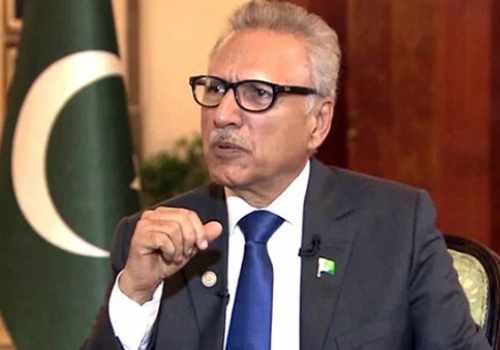ISLAMABAD: In an unexpected turn of events, President Arif Alvi has stated that he did not sign the Official Secrets (Amendment) Bill, 2023, and the Pakistan Army (Amendment) Bill, 2023, contrary to earlier reports, attributing this discrepancy to his staff allegedly acting against his directives.
Alvi’s revelations unfolded on the microblogging platform X, formerly known as Twitter, a day after purportedly granting his assent to both bills.
“Swearing by the Almighty, I did not endorse the Official Secrets Amendment Bill 2023 & Pakistan Army Amendment Bill 2023 due to my disagreement with these legislations,” expressed President Alvi on X.
“I instructed my staff to return the bills without my signature within the designated timeframe, thereby rendering them ineffective. I repeatedly confirmed with them whether the bills had been returned and was assured that they were.”
“However, I have now learned that my staff went against my will and command. As the All-Knowing Allah bears witness, He shall forgive. Yet, I humbly seek forgiveness from those who will be impacted,” he added.
It is noteworthy that two leaders from the Pakistan Tehreek-e-Insaf (PTI) party, Shah Mahmood Qureshi and Imran Khan, were arrested subsequent to the filing of a First Information Report (FIR) against them under the Official Secrets Act. They were charged with divulging contents of the diplomatic cipher for political advantage on August 15.
Following President Alvi’s disclosure, the PTI conveyed its profound concerns, describing his statement as unprecedented, disconcerting, and unimaginable from every angle.
“The President’s tweet has unveiled to the nation a grave malady permeating the entire state apparatus,” remarked the PTI through its official X account.
The party announced its intention to provide a response through its spokesperson after a thorough review of President Alvi’s post.
Furthermore, political and legal experts have contended that President Alvi’s apology falls short and that he should pursue legal action against his staff.
The Pakistan Army (Amendment) Bill, 2023, was passed by the National Assembly on July 31, aimed at penalizing individuals with a potential five-year imprisonment term for disclosing sensitive information concerning national security or the armed forces. Concurrently, the Official Secrets Act received approval shortly before the dissolution of the National Assembly on August 7.
After acquiring approvals from both the Senate and National Assembly, a move met with criticism from members of both the ruling and opposition parties, the bills were presented to the President for final endorsement.
President Alvi’s own party, Pakistan Tehreek-e-Insaf (PTI), also criticized him for ratifying the bills.
Chronology of Bill Approval and Presidential Action
Notably, the Pakistan Army (Amendment) Bill, 2023, was submitted to the President for approval on August 1 and received on August 2.
Subsequently, the Official Secrets (Amendment) Bill, 2023, reached the President for approval on August 8 and was promptly received the same day.
According to Article 75(1) of the Constitution, the President is required to provide assent to approved bills from the Parliament within ten days of their receipt.
“In the case of a Bill other than a Money Bill, return the Bill to the Majlis-e-Shoora (Parliament) with a message requesting that the Bill or any specified provision thereof be reconsidered, and that any amendment specified in the message be considered,” stipulates Article 75(1)(b) of the Constitution.
President Alvi registered his objections to the bills after the constitutionally mandated 10-day period had elapsed.
Under Article 75, a bill that has been sent back by the President must receive approval from a joint session of the Parliament. Following joint session approval, the bill returns to the President for final assent.
If the President does not accord approval within 10 days, the bill automatically becomes law.
The Army and Official Secrets Act Amendments Explained
The revised Army Act introduces the possibility of up to five years’ rigorous imprisonment for any individual found guilty of disclosing information obtained in an official capacity that is or could be detrimental to Pakistan’s security or the armed forces’ interests.
The amendments apply to active and retired officers and personnel of the Pakistan Army, encompassing matters such as commission granting, service terms and conditions determination, welfare activities, national development tasks, and operational and institutional concerns, in accordance with a Supreme Court judgment.
The updated Official Secrets Act empowers the Federal Investigation Agency (FIA) to conduct investigations against individuals suspected of violating it.
Notably, the amendment eliminates the provision that categorized an individual engaging with foreign agents as an enemy.
Of significance, the Act specifies that “the Investigation Officer shall be an officer of the FIA not below the rank of BPS-17 or equivalent, and he shall be designated by Director General FIA. If the Director General FIA deems it necessary, a Joint Investigation Team consisting of intelligence agency officers may be appointed.”
(Islamabad51-Newsdesk)














